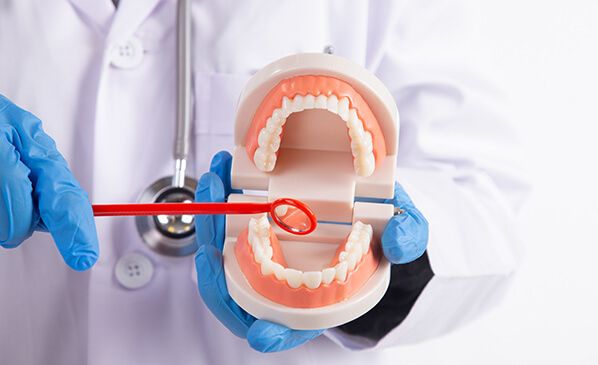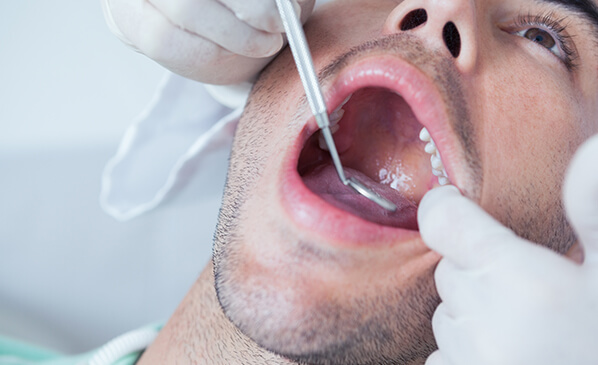Frenectomy in Kirkland, WA

Frenectomy in Kirkland, WA
Speech difficulties, a stubborn gap between the front teeth, slipping dentures, or tightness in the lips, cheeks, or tongue often come from a tight or misplaced frenum. These small bands of tissue can limit tongue movement and pull on gums, making everyday functions harder than they should be.
Left unaddressed, that tension can make eating uncomfortable, distort certain sounds, and make dentures feel unstable. You may also avoid smiling, struggle with specific words, or feel constant irritation where the tissue tugs. The frustration adds up and can affect confidence and long-term oral health.
A simple frenectomy with Dr. Ellie Javadi could be the answer. This quick, minimally invasive procedure takes just minutes but offers lasting relief, improving both function and comfort for better long-term oral health.
What Exactly Is a Frenectomy?
A frenectomy is a minor surgical procedure that removes or releases a “frenum”, the thin band of tissue that connects your lips, cheeks, or tongue to the gums. When this tissue is too tight or positioned poorly, it can limit movement and cause functional & cosmetic issues. The type of frenectomy depends on the affected area:

- Lingual frenectomy: Releases the band under the tongue (lingual frenum), improving speech, swallowing, and oral hygiene for those with tongue-tie (ankyloglossia).
- Labial (upper or lower lip) frenectomy: Addresses a tight frenum between the lips and gums, which can cause gum recession, tooth gaps, or discomfort.
- Buccal frenectomy: Removes restrictive cheek attachments that may trap food or interfere with dentures.
- Palatal frenectomy: Adjusts tissue on the roof of the mouth if it obstructs orthodontic appliances or oral function.
Dr. Javadi performs frenectomies using a gentle laser or micro-scalpel, minimizing discomfort and speeding up recovery.
Signs You May Need a Frenectomy in Kirkland
Tight or low‑attached frena rarely hurt, so the condition often goes unnoticed until it causes functional or periodontal problems. You might need a frenectomy if you experience:
- Speech difficulties: Sounds that require tongue elevation, like T, L, R, feel restricted.
- Gum recession or tooth sensitivity: Noticeable wear on one or two front teeth where the frenum pulls excessively.
- Persistent gap between teeth: Especially if orthodontic treatment couldn’t fully close the space.
- Denture instability: Your partials or dentures shift when speaking or laughing due to lip tension.
- Jaw or neck strain: Constant tension from compensating for limited tongue or lip mobility.

Proven Benefits of a Frenectomy
A tight or restrictive frenum may seem like a minor issue, but it can have a significant impact on your daily life. A quick, minimally invasive laser frenectomy can provide lasting improvements, including:

- Clearer speech & easier swallowing: Releasing the frenum allows your tongue to move freely, improving articulation and eating comfort.
- Better gum health: By reducing tissue tension, a frenectomy helps prevent gum recession and deep periodontal pockets.
- Improved oral hygiene: With greater tongue mobility, cleaning your teeth and sweeping away debris becomes effortless, reducing plaque buildup.
- Orthodontic stability: Removing frenum tension helps maintain proper tooth alignment, preventing gaps from reopening after braces.
- Jaw comfort: A relaxed frenum can decrease muscle tightness, potentially easing headaches and TMJ discomfort caused by clenching.
How Dr. Javadi Performs Your Frenectomy
Dr. Javadi begins with digital photos and periodontal measurements to assess how the frenum affects your gums, bite, and speech. After numbing the area with topical gel and local anesthesia and offering oral sedation for extra comfort, she releases or thins the frenum with a diode laser or micro-scalpel in less than a minute, causing little to no bleeding. She immediately checks tongue or lip mobility, places no stitches or ultra-fine dissolvable ones as needed, and provides printed instructions plus simple stretching exercises to keep the tissue from re-attaching.
Smooth Recovery & Simple After-Care
Most patients return to work or class the same day, but your mouth will need gentle care while the tissue seals and remodels. Follow these clinician-approved steps to keep healing on track and avoid complications:
- Expect mild tenderness for the first 24–48 hours. Over-the-counter pain relievers such as ibuprofen or acetaminophen, along with cool, soft foods (yogurt, smoothies, scrambled eggs), usually control any discomfort.
- Rinse twice daily with a salt-water or prescribed chlorhexidine solution. This reduces bacteria and keeps the surgical site clean without vigorous brushing.
- Perform simple stretching exercises three times a day for one week. Lifting the tongue to the palate or gently moving the lip away from the gums prevents the frenum from re-attaching as it heals.
- Attend a follow-up visit 7–10 days after the procedure. Dr. Javadi will check that the tissue looks healthy pink, moves freely, and shows no signs of infection.
- Plan for complete mucosal healing in about two weeks. During this period, maintain excellent oral hygiene, avoid chewing on the area, and resume normal eating as comfort allows.

Why Choose Dr. Ellie Javadi for Your Frenectomy?
Dr. Ellie Javadi is a board-certified periodontist with over 20 years of experience performing frenectomies. At Orchid Periodontics, we use gentle laser techniques to make the procedure quick and comfortable, with minimal downtime. Our Edmonds office is designed for your comfort, and we take time to explain every step. Patients appreciate our caring approach and the natural results we achieve.
Experience Comfortable Oral Function Today
Serving Kirkland residents with just a convenient 15-20 minute drive north to our Edmonds office, Dr. Ellie Javadi welcomes patients from throughout the greater Seattle area. Schedule your private appointment to learn how a frenectomy can restore free tongue or lip movement and safeguard your long-term gum health. One quick visit is all it takes to start speaking, eating, and smiling with confidence.
Call (425) 775-2002 or click here to book your slot.









Frequently Asked Questions
Is a frenectomy a major surgery?
No, a frenectomy is a minor outpatient procedure typically completed in under 15 minutes with local anesthesia. Most Kirkland patients experience minimal discomfort and return to their normal routines the same day, though gentle care is needed during the two-week healing period.
What is the best age for a frenectomy?
There isn’t a single “best” age, the timing depends on the problem being solved. Infants may need it early if feeding is affected, while labial releases for orthodontic or gum reasons are often done after the permanent canines erupt or near the end of braces in teens or adults; the procedure remains safe and effective at any age when symptoms warrant it.
How long is recovery after a frenectomy?
Recovery is typically quick for Kirkland patients. Most experience mild tenderness for 24–48 hours and can return to work or school the same day. Complete healing of the tissue takes about two weeks, during which you’ll follow simple stretching exercises and maintain good oral hygiene.
Does your face change after a frenectomy?
The surgery removes only a small band of soft tissue so that it won’t alter your facial structure; at most, you might notice a more relaxed lip posture or easier smile closure, and orthodontic gaps may stay closed more predictably.
How far is Kirkland from Oxon Hill?
Dr. Javadi’s practice, Orchid Periodontics, is located in Edmonds, WA, just 15-20 minutes drive from north of Kirkland.
Contact us
Contact us using the information below. We’ll respond promptly to your inquiries and feedback
Hours of Operation
Our Regular Schedule
- MondayClosed
- Tuesday7:00 am - 3:00 pm
- wednesday7:00 am - 3:00 pm
- Thursday7:00 am - 3:00 pm
- FRIDAY1st & 3rd Friday of the month
- SaturdayClosed
- SundayClosed
Schedule An Appointment For Periodontal Treatment For Dental Implants
The first step to improved oral health, the ability to chew better, and a natural smile is to schedule your appointment at Orchid Periodontics & Dental Implants. Dr. Javadi will guide you through the dental implant process and suggest the type of implant that best fits your needs